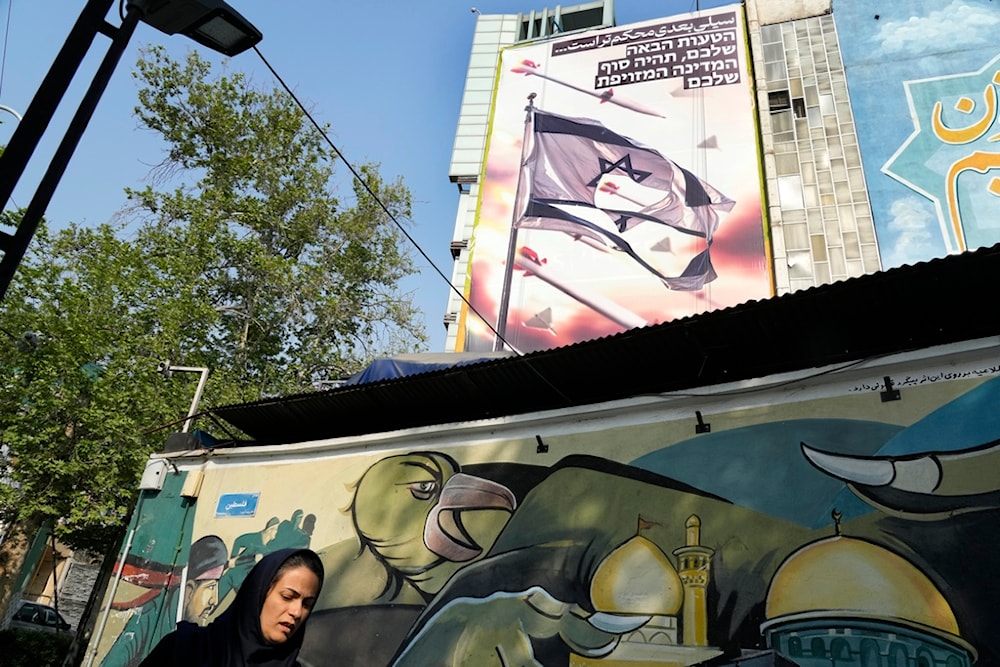Iran's attack stark reminder of lost US, Israeli deterrence
Israeli media say Iran's retaliatory attack against Israeli targets created an opportunity to change the geopolitical situation in the Middle East.
-

A woman walks past an anti-Israeli banner on a building at the Felestin (Palestine) Square in downtown Tehran, Iran, Sunday, April 14, 2024. (AP)
In a related context, the Israeli newspaper Israel Hayom considered that Iran's retaliatory attack against Israeli targets is a stark reminder of the loss of Israeli and US strategic deterrence, highlighting that it created an opportunity to change the geopolitical situation in the Middle East.
The newspaper indicated that Iran has put itself in direct confrontation with "Israel", even at a time that does not seem optimal for it and has acted against US President Joe Biden's warning not to.
It suggested that Iran "has established a sophisticated strategy and is patiently, endlessly trying to create a reality where there becomes a question mark about Israel's existence, not just a theory."
Elsewhere, the newspaper stressed that "Israel" must prioritize and focus efforts on attempting to harness the United States, alongside a large Western alliance, to deal with the Iranian attack to restore deterrence.
In a related context, the Israeli news website Walla! cited a security official as saying that "Israel's" response to Iran's retaliatory strikes may include targeting military infrastructure and weapon depots, extending to assassination operations against officials.
The security official added that estimates indicate the Iranians have not yet said their final word, pointing out that the main battleground would be in the Gaza Strip, and therefore, "we should not expect broad-scale attacks on Iranian interests."
This comes as Iranian officials have made it clear that Iran stands ready to confront any Israeli attack following Operation True Promise launched by Iranian forces in response to the Israeli aggression that targeted the country's consulate in the Syrian capital Damascus on April 1.
Read more: Netanyahu under mounting pressure as he mulls instigating Iran
"Israel" is experiencing "international isolation" and this situation will not end unless "Tel Aviv" adopts a fundamentally different policy, former Israeli Interior Minister Uzi Baram suggested.
In an article published in the Israeli newspaper Haaretz, Baram said that what made "Israel's" cooperation with the United States and some allies possible is the fact that Iran is part of an axis that includes countries like Russia, China, and the DPRK.
However, this cooperation "only occurs during global crises and is not available at all times," he pointed out, stressing that the Israeli regime cannot deceive itself into thinking it can always rely on this cooperation, especially as "Israel" is rapidly losing its status as a "legitimate state" in many parts of the world.
Baram recalled that Arab boycotts have expressed previous hostility towards "Israel" and forced many major global companies to sever ties with the occupation entity, but did not dominate global public opinion against the Israeli regime and waned after the normalization agreements with Egypt and Jordan.
However today, according to Baram, "Israel's" isolation is different, as it comes as a result of "resistance and hostility" from people in many countries around the world.
The former Israeli minister added that "Israel's" current isolation is also due to a real boycott campaign, explaining that for many, every Israeli product or cultural production is illegitimate.
"Zionism has also become, in their view, a movement of oppression and racism."
Furthermore, Baram believed that "Israel, faced with a strategic alliance on one hand and deep isolation on the other, does not need war-mongering statements" made by the likes of Israeli Finance Minister Bezalel Smotrich and Police Minister Itamar Ben-Gvir.
Read more: Turkish restrictions on 'Israel' spark isolation fear: Israeli analyst

 4 Min Read
4 Min Read








